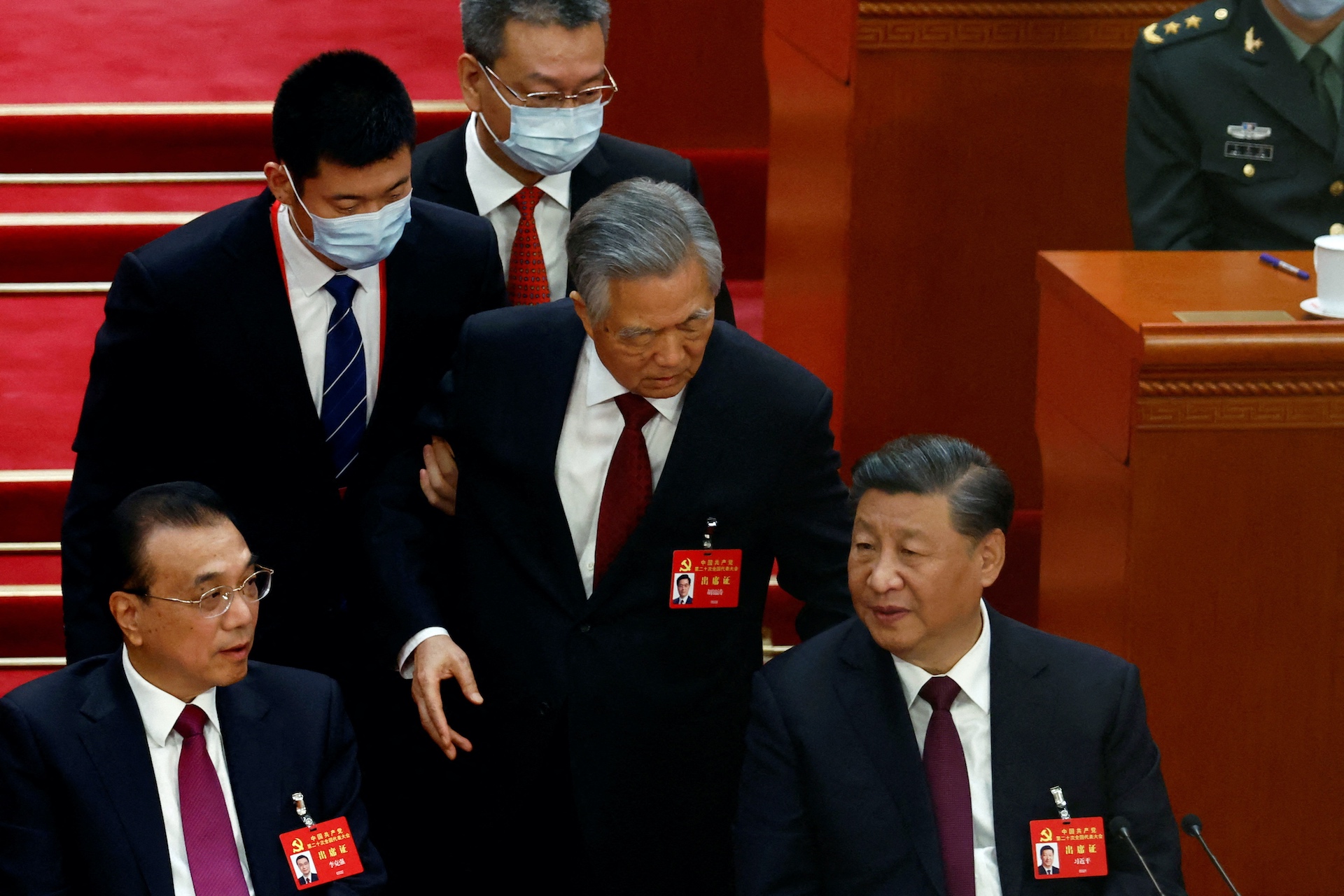After the 20th Party Congress, will Xi stay in power indefinitely?
China’s ruling Communist Party has named the top leaders that will govern the country for the next five years. Unsurprisingly, Xi Jinping is in charge.

After emerging from a closed-door, 368-strong meeting in the Great Hall of the People in Beijing, China’s ruling Communist Party debuted its top leadership for the next five years at the conclusion of its 20th congress on Sunday.
Xí Jìnpíng 习近平 was named General Secretary for a third term as the top position in the seven-member Politburo Standing Committee, the Party’s highest decision-making organ. His widely expected new term breaks with the tradition of the two five-year term limit on the Communist Party’s leadership role and China’s presidency, a safeguard that was put in by former president Dèng Xiǎopíng 邓小平 that was intended to stop another Mao-like figure from consolidating power. (Learn more from The China Project about Xi’s climb to the top here, here, and here.)
- There has been no sign of any younger official being groomed to succeed Xi, leading some analysts to conclude he plans to rule for life, or at least for the foreseeable future.
- At a press conference, Xi lauded the Party’s efforts in modernizing China and lifting the majority of its nearly 1.5 billion population out of poverty. “We’ll be steadfast in deepening reform and opening up across the board, and in pursuing high-quality development,” Xi said.
The rest of China’s most powerful body is dominated by men loyal to Xi, though “none of them with the combination of age and experience that would mark them out as a viable successor,” per the Wall Street Journal: Four new members have been added (names bolded below), while Lǐ Kèqiáng 李克强, Wāng Yáng 汪洋, Wáng Qíshān 王岐山, and Lì Zhànshū 栗战书 have been removed — a clear pivot away from the more liberal era of “reformists” and the “Youth League Faction” (团派 tuánpài). The newly elected Standing Committee members are:
- Cài Qí 蔡奇, 66, Party Secretary of Beijing
- Lǐ Qiáng 李强, 63, 19th and 20th Politburo member, Party Secretary of Shanghai
- Lǐ Xī 李希, 66, 19th and 20th Politburo member, Party Secretary of Guangdong, Secretary of the Central Commission for Discipline Inspection
- Dīng Xuēxiáng 丁薛祥, 60, a senior aide to Xi Jinping
- Wáng Hùníng 王沪宁, 67, Politburo Standing Committee member since 2017, 19th and 20th Politburo member, First Secretary of the Secretariat of the CCP
- Xi Jinping, 69, General Secretary of the Party, President of the PRC, Chairman of the Central Military Commission
- Zhào Lèjì 赵乐际, 65, Politburo member since 2012, Secretary of the Central Commission for Discipline Inspection, former head of the CPC Organization Department
It’s also a man’s world in the rest of the Politburo: While no female members have ever been a part of the top Standing Committee, there are also no female members in China’s second-most-senior leadership group for the first time in 25 years, despite the fact that the equal right of women to participate in politics is constitutionally enshrined in China.
The new changes reflect no regrets about COVID zero: Li Qiang, the man who locked down Shanghai, followed Xi onto the stage at the Great Hall of the People as the second-ranking Politburo Standing Committee member, and the obvious choice for China’s next premier at the annual legislative session in March.
For the rest of the world, more turbulent times lie ahead with the omission of two key slogans from Xi’s report to the congress this year, the New York Times reports: “China’s external environment now can be described as unprecedentedly perilous, and that’s also the judgment of China’s high echelon,” said Hu Wei, a foreign policy scholar in Shanghai.
- The private sector is going to suffer as the state advances: Stocks listed in Hong Kong, Shanghai, and Shenzhen plunged on the first trading day after the results of the big leadership reshuffle were announced.
Meanwhile, former Chinese president Hú Jǐntāo 胡锦涛 was unexpectedly escorted offstage at the closing ceremony on Saturday, creating an awkward moment in the tightly scripted political arena and sparking a storm of speculation online.
- Hu, 79, was sitting to the right of Xi when he was approached by a steward who repeatedly tried to lift him from his seat. Another steward joined and was handed a red folder (presumably Hu’s) by a concerned Li Zhanshu, seated to the right of Hu, before the two stewards guided Hu offstage (videos here and here).
- As he was leaving, Hu said a few words to Xi, who smiled and nodded, and patted Li Keqiang, seated to the right of Xi, on the shoulder.
- But whatever the reason, which state-run news agency Xinhua attributed to Hu’s poor health (Parkinson’s disease and rumored Alzheimer’s) a few hours after the incident, his exit stood for some as a symbolic departure from collective leadership that marked his rule.






